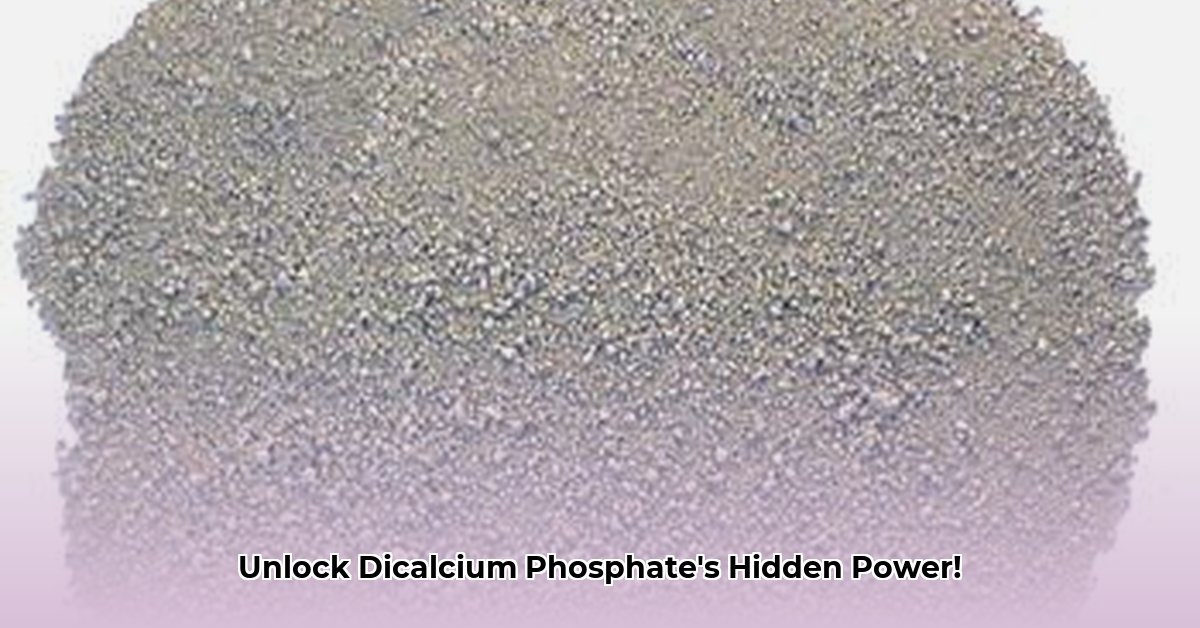“`markdown
Dicalcium Phosphate Benefits: Uses & Side Effects Guide
Thinking about boosting your calcium and phosphorus intake? This comprehensive guide explores dicalcium phosphate (DCP), a widely used supplement. We’ll break down what it is, how it’s used in various applications, its potential benefits and possible downsides, and provide guidance on safe usage. We’ll compare it to similar supplements, clarify the different forms of DCP, and offer practical advice on dosage, potential side effects, and interactions. Whether you’re interested in DCP for supporting bone health, exploring its role in dental products, or curious about its use in various supplements, we’ll equip you with the knowledge to understand how to use it effectively and avoid potential problems. We’ll cover everything from the foundational basics to more advanced strategies, to empower you to make the best choices for your health and well-being. For information on serious health concerns related to mineral imbalances, please see [this resource](https://chaztin.com/can-popping-a-gum-abscess-kill-you/).
Dicalcium Phosphate: Unveiling the Benefits and Potential Side Effects
Dicalcium phosphate (DCP), a versatile mineral compound, holds significant importance in nutrition, pharmaceuticals, and even bone regeneration. It’s composed of calcium and phosphorus, two essential nutrients vital for numerous bodily functions. Primarily, it’s recognized for its role in maintaining strong and healthy bones. However, the applications of DCP extend far beyond just bone health. Let’s delve into the intricacies of this adaptable compound and uncover its diverse applications.
What is Dicalcium Phosphate (DCP)? Understanding its Composition and Properties
DCP is a naturally occurring mineral compound. It’s found in various foods and is added to others to enhance their nutritional value. It exists in several forms: anhydrous (completely devoid of water), monohydrate (containing one water molecule), and dihydrate (containing two water molecules). These distinct forms exhibit slight variations in their absorption rates within the body. This is similar to how different types of fats are processed by the body. While the distinctions between these forms may appear subtle, they can influence the intended application of DCP, such as in supplements or medications. Understanding these subtle differences is key to optimizing its use.
Benefits of Dicalcium Phosphate Supplementing Your Diet
- Bone Health Support: Calcium and phosphorus are essential for building and maintaining strong, healthy bones. DCP provides these vital nutrients in a readily available form. It strengthens bone density, fortifies skeletal structure, and promotes overall bone health. This is particularly beneficial for growing children, adolescents, and adults seeking to maintain bone strength as they age.
- Dietary Enrichment: DCP is frequently added to foods and supplements to fortify their calcium and phosphorus content. Its inclusion enhances the nutritional profile of various food products and contributes to meeting daily nutrient requirements. Seeing “dicalcium phosphate” on a food label indicates an added boost of these essential minerals.
- Pharmaceutical Applications: Beyond its nutritional applications, DCP plays a crucial role in the pharmaceutical industry. It is commonly used as a binding agent in tablets, ensuring their structural integrity and cohesion. DCP’s binding properties facilitate the production of solid dosage forms, such as pills, capsules, and tablets.
- Dental Applications: DCP has also found its place in certain dental products, such as toothpastes and dental powders. Its abrasive properties contribute to tooth polishing and stain removal, promoting oral hygiene and dental aesthetics. Furthermore, DCP assists in remineralizing tooth enamel, strengthening teeth, and preventing tooth decay.
Forms of Dicalcium Phosphate: A Closer Look at its Variants and Characteristics
DCP is available in distinct forms, each characterized by varying water content and properties. These variations influence its solubility, absorption, and overall effectiveness in different applications.
| Form | Water Content | Solubility | Absorption | Key Characteristics |
|---|---|---|---|---|
| Anhydrous | None | Lower | Potentially slower | Highly concentrated, suitable for applications requiring minimal moisture. |
| Monohydrate | One water molecule | Moderate | Moderate | Offers a balance between solubility and stability. |
| Dihydrate | Two water molecules | Higher | Potentially faster | More soluble, potentially beneficial for applications where rapid absorption is desired. |
While these differences exist, ongoing research is exploring the significance of these variations in absorption and bioavailability. Further studies are warranted to fully elucidate the optimal form of DCP for specific applications.
Potential Side Effects of Dicalcium Phosphate: Considerations and Precautions
DCP is generally considered safe when consumed within recommended amounts, excessive intake can lead to gastrointestinal disturbances, such as upset stomach, nausea, vomiting, diarrhea, or constipation. It’s essential to adhere to recommended dosage guidelines to minimize the risk of adverse effects. DCP may interact with certain medications, including antibiotics like tetracyclines and quinolones, potentially affecting their absorption and efficacy. If you’re currently taking any medications, consulting with a healthcare professional before incorporating DCP into your regimen is advised to ensure safety and prevent potential interactions.
Recommended Dosage and Precautions: Ensuring Safe and Effective Use
The appropriate dosage of DCP varies depending on individual factors, nutritional needs, and health status. Factors such as age, gender, overall health, and dietary habits influence the optimal dosage. Always carefully read and follow the instructions on the supplement label. If you have any concerns or underlying health conditions, consulting with your doctor or a registered dietitian is recommended. They can assess your individual needs and determine if DCP supplementation is appropriate for you.
Additional Considerations and Ongoing Research: The Future of Dicalcium Phosphate
Research on DCP continues to evolve, with ongoing studies exploring its potential applications and long-term effects. Scientists are investigating its role in bone regeneration, its impact on kidney function, and its potential interactions with other nutrients and medications. This continuous research aims to enhance our understanding of DCP’s benefits and potential drawbacks, ensuring its safe and effective use across various applications.
How to Choose the Best Dicalcium Phosphate Supplement for Your Body
Key Takeaways:
- Dicalcium phosphate (DCP) supplements provide calcium and phosphorus, essential for bone health and various bodily functions.
- DCP’s bioavailability varies depending on factors such as the production method and individual physiological differences.
- Selecting the right DCP supplement involves evaluating dosage, form (anhydrous vs. dihydrate), purity, and potential interactions with other medications.
- Always seek guidance from your doctor or a qualified healthcare professional before starting any new supplement regimen, including DCP.
Understanding Dicalcium Phosphate and its Role in Supplements
DCP is a widely used dietary supplement containing calcium and phosphorus, crucial minerals essential for maintaining overall health. It’s primarily used to support bone health, especially when dietary intake of these nutrients is insufficient. Navigating the vast landscape of DCP supplements requires careful consideration to choose the optimal product for your individual needs.
Types of Dicalcium Phosphate: Anhydrous vs. Dihydrate and Their Benefits
DCP is primarily available in two forms: anhydrous and dihydrate. The key distinction lies in their water content. Anhydrous DCP is devoid of water molecules, while dihydrate DCP contains water molecules bound to the calcium phosphate compound. This difference influences the supplement’s weight, concentration, and absorption characteristics. Therefore, it’s crucial to carefully compare labels and assess your specific needs before making a purchase.
Factors to Consider When Choosing a Supplement for Your Health
Choosing the best dicalcium phosphate supplement involves a comprehensive evaluation of several key aspects:
- Purity and Source: Opt for supplements from reputable manufacturers committed to stringent quality control measures and purity testing. Verify the product label for potential contaminants or additives.
- Dosage: The appropriate dosage varies based on individual needs, health conditions, and dietary habits. Always adhere to the recommended dosage instructions provided on the label, and consult with a healthcare practitioner for personalized guidance.
- Form: Determine whether anhydrous or dihydrate DCP is best suited to your needs. Consider the concentration of calcium and phosphorus per serving, as well as the supplement’s ease of use and palatability.
- Additional Ingredients: Scrutinize the ingredient list for any unnecessary fillers, additives, or allergens that may not be beneficial or suitable for your needs.
- Third-Party Testing: Prioritize supplements that have undergone third-party testing and certification by independent laboratories. This ensures the product’s purity, potency, and compliance with quality standards.
- Cost-Effectiveness: Compare prices per serving to identify an option that aligns with your budgetary constraints. However, remember that the most expensive option is not always the best. Focus on quality, purity, and effectiveness, rather than solely relying on price.
Potential Benefits and Side Effects: An Evaluation Overview
DCP offers several potential benefits, primarily supporting bone health, dental health, and overall mineral balance. However, it’s crucial to be aware of potential side effects, especially with excessive intake. These can include gastrointestinal discomfort, such as constipation or diarrhea, as well as rare but more serious issues like hypercalcemia (elevated blood calcium levels).
Addressing Your Concerns: Consultation is Key with Your Healthcare Provider
Prior to incorporating DCP into your health regimen, consult with a qualified healthcare professional. They can assess your individual needs, evaluate potential risks and benefits, and provide personalized recommendations based on your health status, medications, and dietary habits.
Making an Informed Decision About Supplementing Your Diet
Selecting the right dicalcium phosphate supplement requires careful consideration, attention to detail, and informed decision-making. By evaluating purity, dosage, form, and potential interactions, you can
- Compartment Food Containers Make Meal Prep and Lunch Packing Easy - February 10, 2026
- Divided Lunch Containers Revolutionize Your Meal Prep Strategy - February 9, 2026
- Divided Food Storage Containers Transform Meal Prep and Portion Control - February 8, 2026










